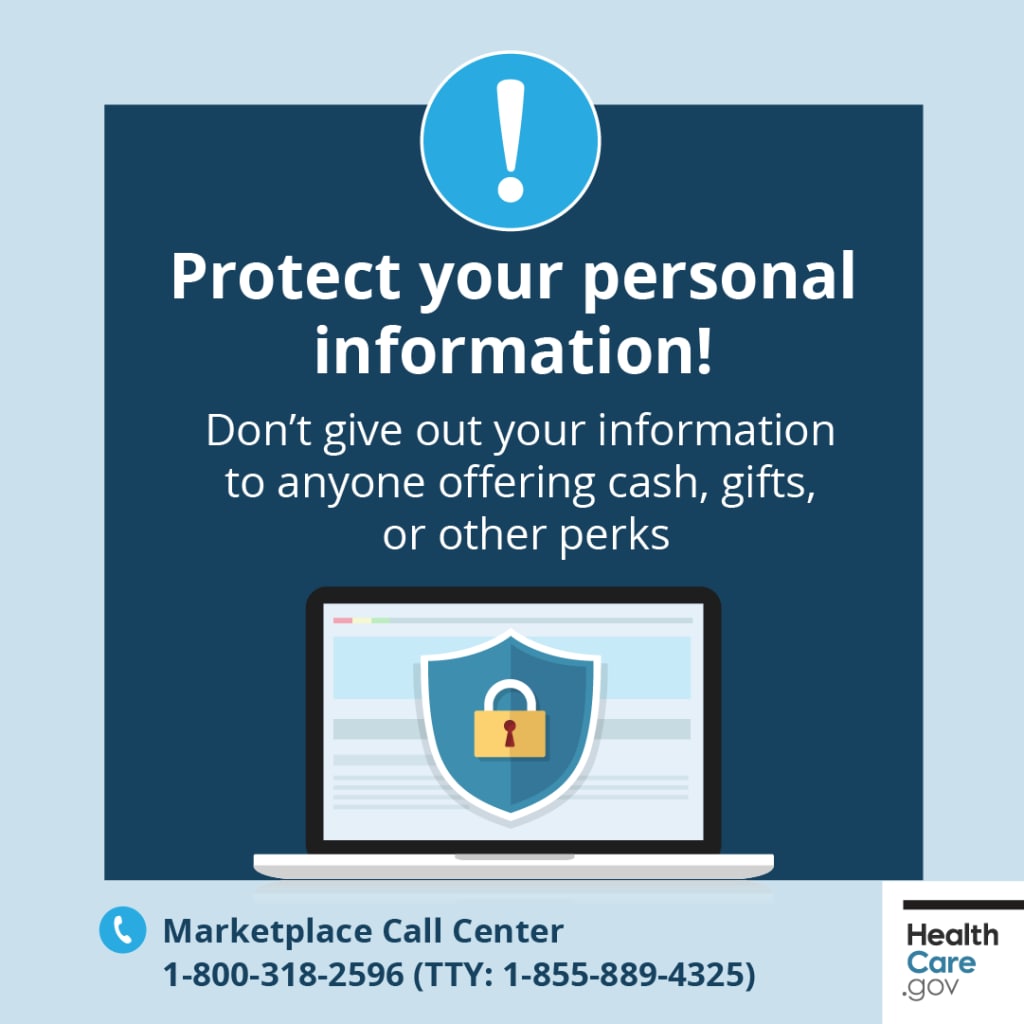Protect yourself from Marketplace fraud & scams
When you apply for health coverage through the Marketplace, help keep yourself safe from fraud and scams by taking a few simple steps: Identify, protect, and report.

Step 1: Identify trustworthy sources
- Get health coverage information from official government websites, like HealthCare.gov, and print materials. Check for official government seals, logos, and web addresses ending in “.gov.”
- Stay alert for scams. Be cautious of health insurance ads on social media offering cash, gifts, or other perks. The information you share could be used without your consent.
- Get to know the Marketplace.
- Compare insurance plans carefully before making your decision.
- Add Marketplace Open Enrollment dates to your calendar. You can get or change a Marketplace health plan during , or if you qualify for abased on income or a.
- Apply and enroll on HealthCare.gov. We're the official source for the Marketplace.
- Connect with us or a trusted partner.
- Contact the Marketplace Call Center 24 hours a day/7 days a week for free, non-biased personal help. Available in other languages.
- Find enrollment partners approved by us. These are the only partner websites approved by the Marketplace to provide you quotes and help you enroll in coverage.
Step 2: Protect your personal information
- Don’t share personal information – Social Security Number (SSN), banking, credit card, and account numbers, and personal health information (like your medical history or specific medical services you’ve gotten).
- Don’t give money – Credit card payment, gift cards, cash, prepaid debit card, or cryptocurrency – to anyone claiming you must pay them to keep or apply for coverage. The Marketplace, assisters, and your state will never threaten you or your household or ask for your credit card information or payment to keep or qualify for health coverage.
- Protect your online Marketplace account – Get a unique security code that’s randomly generated and sent to you each time you log in. This way, it’s harder for someone to access your account, even if they get your password.
- Make sure someone is who they say they are – Ask questions if anything is unclear or doesn’t sound right, and don’t provide payment information. (You’ll pay your premiums directly to the plan, not anyone else.)
Step 3: Report suspicious activity
Report suspected fraud or scams if:
- Someone other than the insurance company you’ve chosen or someone you don’t know contacts you about health insurance and asks you to pay – or asks for your financial or personal health information.
- Someone contacts you and claims to be from the government, your state, Marketplace, Medicaid, CHIP, or Medicare – and asks you to pay or send them gift cards to get or keep coverage.
- You give your personal health, bank account, or credit card information to someone who calls you and says they’re from the government.
- Someone calls, emails, or texts asking for your information (like your SSN) or for money (like credit card payment, gift cards, cash, prepaid debit card, or cryptocurrency) or if they threaten you or anyone in your household with legal action.
- You suspect identity theft, or feel like you gave your personal information to someone you shouldn’t have.
Report any suspicious activity to the Federal Trade Commission. Also, contact your local police department and the Marketplace Call Center to explain what happened. We’ll take the appropriate next steps to protect your information.
